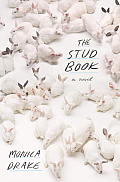
People ask how long it takes to write a novel. It's a hard question to answer. There's the writing process itself, but also the life history, time spent collecting material whether you know you're doing it or not.
When I was 17, I saw a flyer tacked up in a school hallway offering an internship at the Oregon Zoo. I applied and got it.
Then I had this lovely, unpaid gig watching animals. I was sort of an animal babysitter, minus the frozen pizza and any actual power to set a bedtime. For hours, usually in a light rain, I'd stand near an enclosure at the zoo and watch a herd of three elephant cows and their three babies. I had a clipboard, a checklist, and a timer. I'd read long textbooks on animal behavior. Once in a while I'd take a test on theory and terminology. Mostly, my job meant being alone, sometimes in a crowd, with time to think.
Every 45 seconds, when the timer went off, I'd record behavior: Play behavior. Motoring. Grooming. Nursing.
This habit of observation became a way of looking at the world.
At the end of my internship I wrote a paper, "Infant Asian Elephant Development and Play Behavior." My data showed that one baby, Rama, tended to "play" more than the others. Like most research, I drew no exact conclusions. Maybe he was born into better weather, maybe his mother had different mothering skills, or maybe the data spoke to a difference in his character, his health, his world view — if an elephant can be said to have a world view. (Technically, that kind of talk, anthropomorphizing, was off limits.)
When the internship ended, I traveled to Europe and shifted my studies to art history. Art history seemed so important in Europe! There was a lot of art.
I never forgot the elephants, though.
I didn't go back to the Oregon Zoo for decades — until I had a baby of my own. Once my child was born, I watched her with an eye to observation. I watched her every second: sleeping, nursing, play behavior.
When she was a toddler, I went back to those same zoo paths, now with my offspring. Rama was there, grown up. If you were to go to the zoo today, you'd see him. He's the most compact of the bull elephants. To find him roaming in the zoo enclosures, years after I'd left him, was like going back to a small town and seeing an old friend. This was his life, for better or worse.
He's a painter. His work sells for good money.
There's always controversy around elephant care and conservation. There's a lot of brutality and danger in the world at large. Walk through a zoo, and most of the animals will have plaques in front of their enclosures. Most of the plaques will talk about endangered species status. One of the key contributors? Human encroachment on animal territory.
There are over seven billion humans crawling the planet. A lot of the new babies? The luckiest of them will visit zoos, all over the world. As a species, humans debate if the planet is overpopulated. We can debate — as the mammals in charge, we have that luxury! If you could ask an elephant, though, I bet you'd get a yes vote: yes, there are a lot of humans.
Human children press against the glass at the zoo, leaving dirty handprints. They swing on metal bars, yell and cry and fuss.
Are there enough of us yet?
They scream through the wild bird show. They eat hot dogs and throw cups on the ground.
In the wild, people deforest wilderness areas, pour carcinogens in the water, kill animals for their body parts — their tusks, feet, tails, and baculum — for trophies and sport.
Theories of overpopulation have been built around food supply. Biotech engineering has increased food production, making way for more babies! But is that — food — really enough to support, and perhaps to justify, a new life? Is food our entire standard?
I have all respect for every baby born on this planet. Once you build a human inside your own body, or inside a partner's body, you have an obligation to support that person. And I don't mean to just offer food.
In the New York Times last winter, a man who doesn't need to be named here wrote, "Today's babies are tomorrow's taxpayers..." He was encouraging American women to make more babies, to fuel an American economy.
Babies grow up to work, spend, consume, take on debt, and pay taxes. Yay, babies! We're all grown babies. Put that on a diaper ad.
It's been decades since I stood outside the enclosures at the zoo with my timer and clipboard, but I've never lost my sense of empathy for the animals, living their trapped lives on our crowded planet.
This doesn't quite sound like comedy, does it?
My new novel, The Stud Book, is an edgy, digressive comedy about population. It comes out of considering these same questions: how to raise a child, to have that animal experience, that human bond, but still support biological diversity and the ecosystems that support us.
It's all linked.
So how long does it take to write a novel? I'm going to say forever. As long as we live on the planet, animals and plants, we're writing one long book, together.
More from Monica Drake on PowellsBooks.Blog: